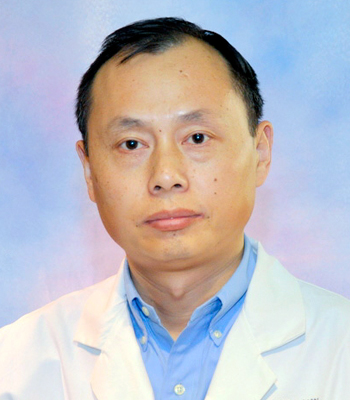Guojun Wu
Address
824 HWCRC 4100 John R. Detroit, MI 48201Office Address
824 HWCRC
4100 John R.
Detroit, MI 48201
Mentoring
Allison Mitchell ( Senior Student ) and C James Block ( MD/PhD )
Department
Oncology
Research Description
My laboratory is focusing on deciphering the molecular mechanisms involved in human breast cancer initiation, progression and metastasis, as well as chemoresistance. Based on the mechanisms identified, we will then develop novel therapeutic strategies to overcome these clinical challenges with an eventual goal of curing malignant breast cancer.
Two major projects are currently ongoing in the laboratory.
1. Transcriptional regulation of novel metastasis driving genes in TNBC. Using global profiling technologies, including genomics, proteomics and metabolomics, we identify new molecular signatures in EMT program and cancer stem cells. We are now investigating the functional roles of the EMT promoting transcription factors in breast cancer metastasis and chemoresistance using integrative genetic, epigenetic approach as well as animal models and clinical specimens. We are specifically interested in discovering novel molecular mechanisms of transcriptional regulation of these EMT driving genes. These mechanisms include recruiting epigenetic modulators for transcriptional activation and interaction with spliceosome to facilitate RNA splicing.
2. Molecular characterization of metastasis driving proteins in metabolic reprogramming in TNBC cells. There is increasing evidence that mitochondrial dysfunction and metabolic reprogramming are closely associated with modulation of cell cycle and cell differentiation, which promotes cancer progression to a metastatic phenotype. However, there have been few studies linking pro-metastatic genes to impaired mitochondrial function and metabolic reprogramming. We demonstrate that a novel metastasis driving protein EGFL9 can not only regulates cMET signaling pathway, but also translocates to the mitochondria and drives a metabolic switch from oxidative phosphorylation to glycolysis. We are now clarifying this protein in TNBC and studying the detailed mechanism of EGFL9 in regulating metabolism in TNBC cells using LC-MS/MS based targeted metabolomics. The effect of these metabolites regulated by EGFL9 on cancer cells or tumor microenvironment will be further analyzed.
Selected Publications
1. Mitchell AV., Wu L., Block CJ., Zhang M., Hackett J., Craig DB., Chen W., Zhao Y., Zhang B., Dang Y., Zhang X., Zhang S., Wang C., Gibson H., Pile LA., Kidder B., Matherly L., Yang Z, Dou Y., Wu G.. FOXQ1 Recruits the MLL Complex to Activate Transcription of the EMT Program and Promote Breast Cancer Metastasis. Nat. Commun. 2022; 13, 6548.
2. Mitchell AV., Wu J., Meng F., Dong L., Block CJ., Song WM., Zhang B., Jing Li, Wu G.. DDR2 coordinates EMT and metabolic reprogramming as a shared effector of FOXQ1 and SNAI1. Cancer Res. Commun.. 11/2022;2(11):1388-1403.
3. Block CJ֗֗, Mitchell AV, Wu L, Glassbrook J, Craig D, Chen W, Dyson G, DeGracia D, Polin L, Ratnam M, Gibson H, Wu G.. RNA binding protein RBMS3 is a common EMT effector that modulates triple-negative breast cancer progression via stabilizing PRRX1 mRNA. Oncogene. 2021;40(46):6430-6442.
4. Block CJ, Dyson G, Campeanu IJ, Watza D, Ratnam M, Wu G. A stroma-corrected ZEB1 transcriptional signature is inversely associated with antitumor immune activity in breast cancer. Sci Rep. 2019; 9(1):17807.
5. Meng F, Wu L, Dong L, Mitchell AV, Block CJ, Liu J, Zhang H, Lu Q, Song WM, Zhang B, Chen W, Hu J, Wang J, Yang Q, Hüttemann M, Wu G. EGFL9 promotes breast cancer metastasis by inducing cMET activation and metabolic reprogramming. Nat Commun. 2019 Nov 6;10(1):5033.
6. Wu L, Meng F, Dong L, Block CJ, Mitchell AV*, Wu J, Jang H, Chen W, Polin L, Yang Q, Dou QP, Wu G. Disulfiram and BKM120 in Combination with Chemotherapy Impede Tumor Progression and Delay Tumor Recurrence in Tumor Initiating Cell-Rich TNBC. Sci Rep. 2019; 9(1):236.
7. Meng F., Speyer CL., Zhang B., Zhao Y., Chen W., Gorski DH., Miller FR., Wu G.. PDGFRα and β Play Critical Roles in Mediating Foxq1-Driven Breast Cancer Stemness and Chemoresistance. Cancer Res., 2015; 75(3):584-93.
8. Zhang H, Meng F, Wu S., Kreike B., Chen W., Sethi S., Miller FR, and Wu G.. Engagement of I-branching β-1, 6-N-acetylglucosaminyltransferase GCNT2 in Breast Cancer Metastasis and Transforming Growth Factor-β Signaling. Cancer Res., Cancer Res. 2011; 71(14):4846-56.
9. Zhang H, Meng F, Liu G, Zhang B, Zhu J, Wu F, Ethier SP, Miller F, and Wu G.. Forkhead Transcription Factor Foxq1 Promotes Epithelial-Mesenchymal Transition and Breast Cancer Metastasis. Cancer Res. 2011, 71(4):1292-301.
10. Zhang H., Chen D., Ringler J, Chen W, Cui Q, Ethier SP, Dou QP., Wu G.. Disulfiram Treatment Facilitates PI3K Inhibition in Human Breast Cancer Cells In Vitro and In Vivo. Cancer Res, 2010, 70(10):3996-4004
Education/Training
PhD (1998): Fudan University, Shanghai, China
Post-Doc (1998-2001): Mayo Clinic, Rochester, Minnesota
Post-Doc (2001-2006): Johns Hopkins University School of Medicine, Baltimore, Maryland
Courses Taught
CB7210 Fundamentals of Cancer Biology (Course Co-Director)
CB7220 Molecular Biology of Cancer Development
CB7240 Principles of Cancer Therapy
CB7300 Special Topics F31 Grant Writing Course
CB7460 Mechanism of Neoplasia: Alterations to Cellular Signaling
MGG7010 Molecular Biology and Genetics
PSL 6300 Biotechnology: Techniques and Applications
Courses taught by Guojun Wu
Fall Term 2025 (future)
Spring-Summer Term 2025 (current)
Winter Term 2025
Fall Term 2024
- CB7460 - Mechanisms of Neoplasia: Alterations to Cellular Signaling
- CB7700 - Recent Developments in Cancer Biology
- MGG7010 - Molecular Biology and Genetics
Winter Term 2024
- CB7210 - Fundamentals of Cancer Biology
- CB7240 - Principles of Cancer Therapy
- CB7700 - Recent Developments in Cancer Biology
